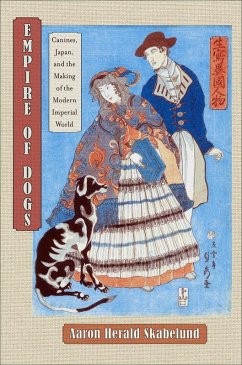In 1924, Professor Ueno Eizaburo of Tokyo Imperial University adopted an Akita puppy he named Hachiko. Each evening Hachiko greeted Ueno on his return to Shibuya Station. In May 1925 Ueno died while giving a lecture. Every day for over nine years the Akita waited at Shibuya Station, eventually becoming nationally and even internationally famous for his purported loyalty. A year before his death in 1935, the city of Tokyo erected a statue of Hachiko outside the station. The story of Hachiko reveals much about the place of dogs in Japan's cultural imagination.
In the groundbreaking Empire of Dogs, Aaron Herald Skabelund examines the history and cultural significance of dogs in nineteenth- and twentieth-century Japan, beginning with the arrival of Western dog breeds and new modes of dog keeping, which spread throughout the world with Western imperialism. He highlights how dogs joined with humans to create the modern imperial world and how, in turn, imperialism shaped dogs' bodies and their relationship with humans through its impact on dog-breeding and dog-keeping practices that pervade much of the world today.
In a book that is both enlightening and entertaining, Skabelund focuses on actual and metaphorical dogs in a variety of contexts: the rhetorical pairing of the Western "colonial dog" with native canines; subsequent campaigns against indigenous canines in the imperial realm; the creation, maintenance, and in some cases restoration of Japanese dog breeds, including the Shiba Inu; the mobilization of military dogs, both real and fictional; and the emergence of Japan as a "pet superpower" in the second half of the twentieth century. Through this provocative account, Skabelund demonstrates how animals generally and canines specifically have contributed to the creation of our shared history, and how certain dogs have subtly influenced how that history is told. Generously illustrated with both color and black-and-white images, Empire of Dogs shows that human-canine relations often expose how people-especially those with power and wealth-use animals to define, regulate, and enforce political and social boundaries between themselves and other humans, especially in imperial contexts.
In the groundbreaking Empire of Dogs, Aaron Herald Skabelund examines the history and cultural significance of dogs in nineteenth- and twentieth-century Japan, beginning with the arrival of Western dog breeds and new modes of dog keeping, which spread throughout the world with Western imperialism. He highlights how dogs joined with humans to create the modern imperial world and how, in turn, imperialism shaped dogs' bodies and their relationship with humans through its impact on dog-breeding and dog-keeping practices that pervade much of the world today.
In a book that is both enlightening and entertaining, Skabelund focuses on actual and metaphorical dogs in a variety of contexts: the rhetorical pairing of the Western "colonial dog" with native canines; subsequent campaigns against indigenous canines in the imperial realm; the creation, maintenance, and in some cases restoration of Japanese dog breeds, including the Shiba Inu; the mobilization of military dogs, both real and fictional; and the emergence of Japan as a "pet superpower" in the second half of the twentieth century. Through this provocative account, Skabelund demonstrates how animals generally and canines specifically have contributed to the creation of our shared history, and how certain dogs have subtly influenced how that history is told. Generously illustrated with both color and black-and-white images, Empire of Dogs shows that human-canine relations often expose how people-especially those with power and wealth-use animals to define, regulate, and enforce political and social boundaries between themselves and other humans, especially in imperial contexts.
Dieser Download kann aus rechtlichen Gründen nur mit Rechnungsadresse in A, D ausgeliefert werden.









